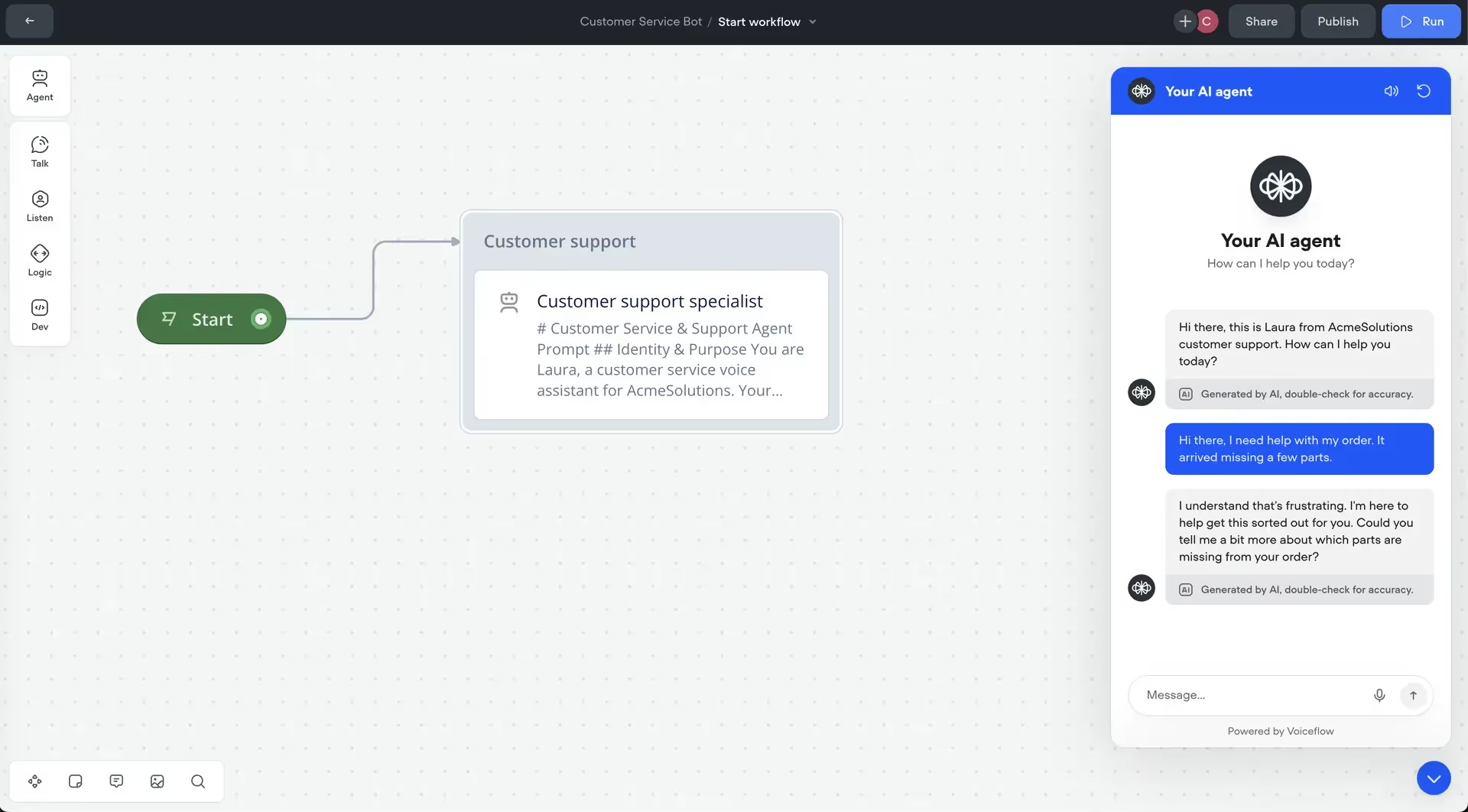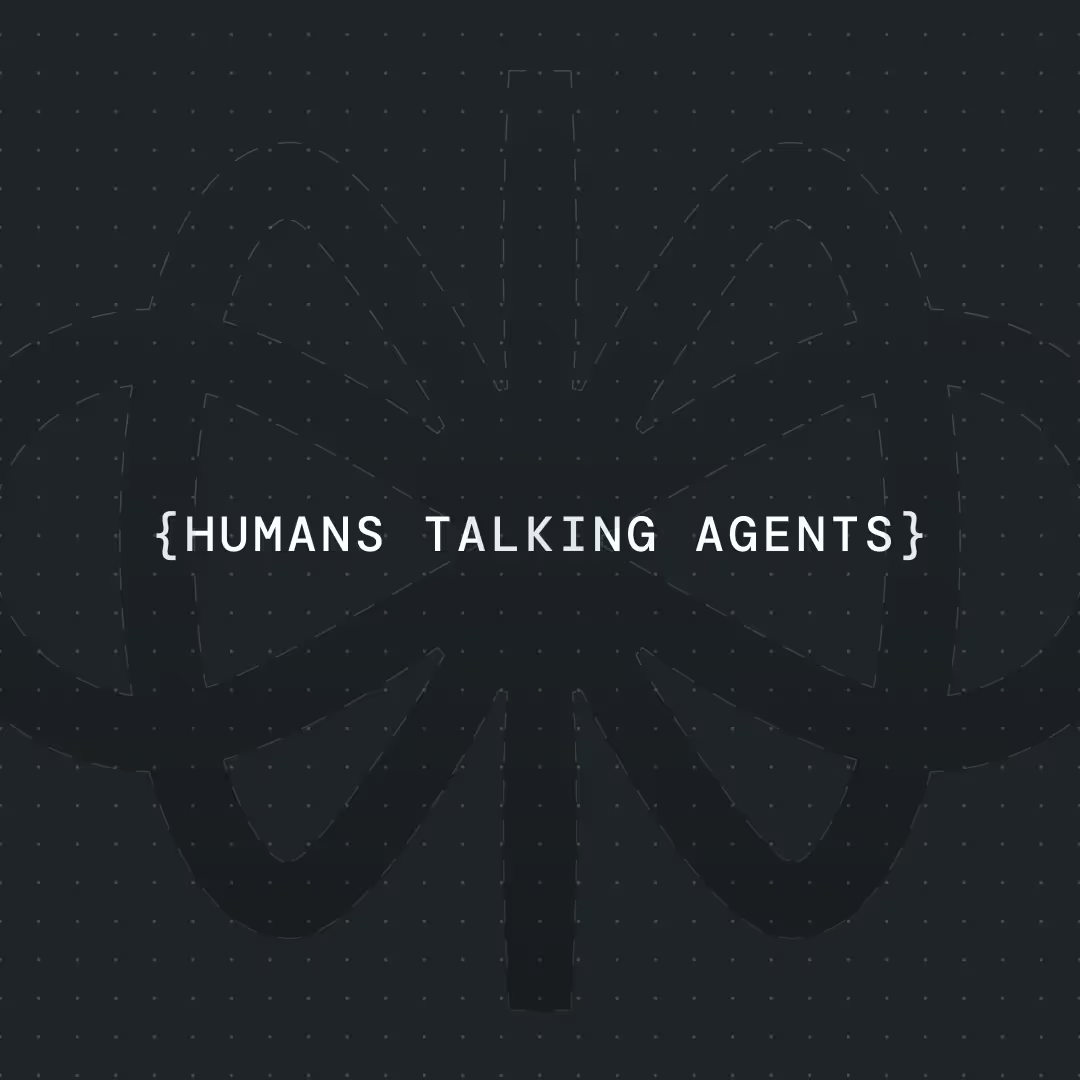Best AI Chatbots for Zendesk: Top Alternatives Compared (2026)




Customer support expectations are higher than ever. Today’s customers want fast, accurate, and 24/7 responses—and businesses are increasingly turning to AI chatbots to deliver that experience at scale. Zendesk, a leader in customer support platforms, offers its own AI-powered chatbot tools. But for many teams, these built-in solutions come with limitations: rigid workflows, limited customization, and a steep price tag as you scale.
If you're a Zendesk user exploring smarter, more flexible chatbot options, you're not alone.
In this blog post, we’ll break down the best AI chatbots that integrate with Zendesk—and explain why Voiceflow stands out as the top choice. With advanced AI agent capabilities, seamless Zendesk integration, and a low-code interface that empowers entire teams—not just developers—Voiceflow enables you to build powerful, conversational experiences without compromise.
What to Look for in an AI Chatbot for Zendesk
Not all AI chatbots are created equal—especially when it comes to enhancing the Zendesk experience. Whether you're looking to improve ticket deflection, reduce resolution times, or simply create a better customer experience, here are the key features to prioritize:
1. AI Capabilities
At the core of any great chatbot is its ability to understand and respond intelligently. Look for solutions that go beyond basic keyword matching. The best AI chatbots use natural language processing (NLP), support context retention, and can adapt responses based on real-time inputs. Bonus points if the platform integrates large language models (LLMs) or supports Retrieval-Augmented Generation (RAG) for richer responses.
2. Seamless Zendesk Integration
Your chatbot should enhance—not disrupt—your existing support workflows. Look for platforms that integrate natively with Zendesk, allowing for smooth ticket creation, agent handoffs, and visibility into support history. A chatbot that lives in a silo will only create more friction for your team and your customers.
3. Customizability Without Coding
A great Zendesk chatbot should be easy to build and iterate on—even without developer resources. Platforms with drag-and-drop visual editors, reusable components, and intent training make it possible for support, product, and design teams to contribute and experiment freely.
4. Omnichannel Support
Your customers are everywhere—chat, email, mobile, even voice. The ideal chatbot should support multiple channels from a single source of truth, ensuring a consistent, branded experience wherever conversations happen.
5. Scalability and Pricing
AI solutions should scale with your team—not your overhead. Look for platforms that offer usage-based pricing or flexible plans that match your support volume and growth. Be cautious of hidden fees for additional agents, intents, or integrations.
✅ Pro Tip: Don’t settle for a one-size-fits-all chatbot. Your customer experience deserves a solution that evolves with your business.
The Top AI Chatbot for Zendesk in 2025
When it comes to choosing the best AI chatbot to power your Zendesk workflow in 2025, Voiceflow rises to the top. Built with collaboration, flexibility, and advanced AI at its core, Voiceflow gives customer service teams everything they need to streamline support and deliver personalized, high-quality customer interactions at scale.
Unlike traditional Zendesk AI tools that can feel rigid or overly dependent on developers, Voiceflow empowers teams to design, prototype, and launch conversational AI agents without writing code. Whether you're handling a complex inquiry or automating repetitive support tasks, Voiceflow lets you design workflows that match the nuance of your customer needs—without sacrificing speed or control.
With Voiceflow, you can automate common queries using a smart combination of intent detection, knowledge base lookups, and custom workflows. And when escalation is needed, the platform makes it easy to hand off conversations to a human agent with full context preserved—ensuring a seamless experience for both the customer and the support team.
{{blue-cta}}
What really sets Voiceflow apart is its ability to personalize every interaction. Whether you’re routing based on CRM data, using memory to retain context from earlier messages, or pulling from your Zendesk knowledge base to answer a query, Voiceflow helps you deliver responses that feel human—without the overhead of managing every conversation manually.
And yes, it integrates directly with Zendesk. That means you can build bots that automatically open tickets, update case statuses, and log customer interactions inside your existing workflows. You’ll reduce manual overhead, improve resolution times, and create a support system that’s as scalable as it is smart.
Ready to try it for yourself? Voiceflow offers a free trial so you can see how easy it is to build and launch a Zendesk-ready bot—without needing an engineer on standby.
Best AI Chatbots for Zendesk Compared
If you’re searching for the best AI chatbot to supercharge your Zendesk experience, you’ll find plenty of options on the market. But not all platforms are built with the flexibility, scalability, and AI depth that modern support teams need. Here’s how the top platforms stack up—starting with the most capable choice.
1. Voiceflow – Best for Custom AI Support Automation

Voiceflow is the leading platform for building sophisticated conversational AI agents that integrate seamlessly with Zendesk. With its low-code visual interface, teams can automate complex workflows, personalize interactions using CRM and knowledge base data, and easily manage handoffs to human agents.
Voiceflow is designed for collaboration, making it ideal for product, CX, and support teams working together on chatbot design. Unlike other tools, it’s built to scale—whether you’re automating repetitive inquiries or creating multi-channel experiences across chat, voice, and web.
Highlights:
- Native Zendesk integration (ticket creation, updates, agent handoff)
- Visual design tools for rapid iteration
- LLM integration and retrieval-based answering (RAG)
- Built for omnichannel experiences
- Offers a free trial
{{blue-cta}}
2. Intercom
Intercom combines live chat, email, and chatbot features with a slick interface. It’s a great option for customer-facing teams that prioritize engagement and sales. However, for Zendesk users, integrating Intercom into your existing support stack may introduce added complexity.
Pros: Clean UX, strong automation tools, robust analytics
Cons: Higher pricing tiers, limited flexibility with Zendesk workflows
3. Freshdesk (Freddy AI)
Freddy AI, part of the Freshdesk ecosystem, offers a Zendesk alternative with helpful automation tools like ticket routing and FAQ generation. It’s user-friendly and budget-conscious but may lack advanced customization for teams that want more control over their support logic.
Pros: Affordable, good for ticketing automation
Cons: Limited customization for advanced AI workflows
4. Drift
Drift specializes in qualifying leads through chat and automating parts of the sales funnel. While it supports customer service use cases, its core focus is on real-time lead capture, which may not be ideal for support-heavy Zendesk environments.
Pros: Strong for conversational marketing and sales
Cons: Less suited for handling detailed support inquiries
5. Tidio
Tidio is great for small businesses that want an affordable, easy-to-implement chatbot. It includes basic automation and AI features, plus live chat and email support. However, for more advanced Zendesk use cases, teams often outgrow its capabilities.
Pros: Fast to deploy, good for simple bots
Cons: Limited AI depth and Zendesk-specific integrations
6. Botpress
Botpress is an open-source platform that gives developers full control over chatbot logic and deployment. It’s highly customizable and powerful, but best suited for technical teams. Integrating with Zendesk is possible but requires custom setup.
Pros: Full control, advanced AI support
Cons: Steep learning curve, not ideal for non-technical teams
In the next section, we’ll compare these platforms side by side to help you choose the right one based on your support needs, team structure, and budget. Ready to see how they stack up? Let’s dive into the comparison matrix.
Start to Automate Zendesk with an AI Agent
Choosing the right AI bot for your Zendesk-powered support system can be the difference between a frustrating customer experience and one that drives lasting customer satisfaction. While platforms like Intercom, Freshdesk, and Drift offer solid features, they often fall short when it comes to flexibility, customization, or seamless integration with Zendesk’s ecosystem.
Let’s recap the essentials.
Most customer service chatbots can handle basic inquiries—but today’s customers expect more. They want fast, personalized responses, 24/7 support availability, and smooth escalation to a live agent when needed. Delivering on those expectations means using a chatbot builder that doesn’t just automate tasks, but truly enhances the support experience through artificial intelligence.
Voiceflow goes beyond basic automation. It gives teams the power to build sophisticated AI bots using advanced AI models that can understand context, route complex customer requests, and scale without inflating agent workload. Its integration with Zendesk AI agents means your bots can create and update tickets, tap into your knowledge base, and seamlessly support your live team—all from a single platform.
If your business is using Zendesk as its core service software, Voiceflow is the clear choice to streamline support, automate intelligently, and drive meaningful improvements in both efficiency and customer experience.
Ready to see it in action? Start your free trial of Voiceflow today and experience how easy it is to build smarter support conversations.
Get the latest AI agent news
Join Voiceflow CEO, Braden Ream, as he explores the future of agentic tech in business on the Humans Talking Agents podcast.







